
Introduction: Fueling Your Plant-Based Journey with Premium Protein
In recent years, the shift towards plant-based diets has gained immense momentum across the globe, particularly in the US and UK. Whether driven by ethical considerations, environmental concerns, or personal health goals, more and more individuals are embracing veganism. With this surge in plant-based living comes a growing demand for high-quality, effective, and delicious vegan protein supplements. Protein powder, once primarily associated with bodybuilders and athletes, has become a staple for anyone looking to support muscle growth, aid recovery, manage weight, or simply ensure adequate protein intake in their diet. Keywords: best vegan protein powder US, top vegan protein UK, plant-based protein supplements.
However, navigating the vast and ever-expanding market of vegan protein powders can be a daunting task. With countless brands, protein sources, and formulations available, choosing the right product can feel overwhelming. This comprehensive guide aims to simplify that process for you. We’ve meticulously researched and analyzed the top contenders in the vegan protein powder landscape, focusing on products that cater specifically to the needs and preferences of consumers in the United States and the United Kingdom. Our goal is to provide you with an in-depth look at the best vegan protein powders, helping you make an informed decision that aligns with your health objectives and dietary requirements. Keywords: vegan protein powder reviews, compare vegan protein, UK vegan supplements, US plant protein.
Beyond just listing products, we’ll delve into what makes a great vegan protein powder, exploring different protein sources, essential ingredients to look for (and avoid), and how to incorporate these supplements effectively into your daily routine. We’ll also address common concerns and provide practical tips to ensure you get the most out of your plant-based protein. By the end of this guide, you’ll be equipped with all the knowledge you need to confidently select the perfect vegan protein powder to fuel your plant-based journey and achieve your fitness and wellness goals. Keywords: choosing vegan protein, vegan protein benefits, plant-based diet tips.
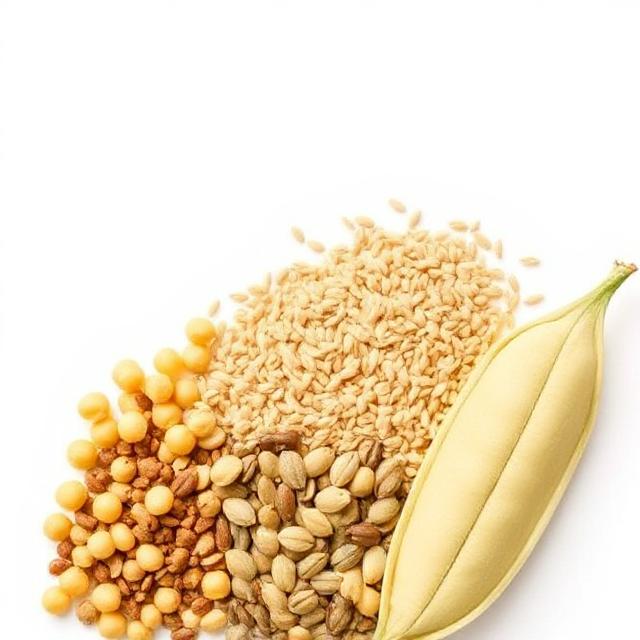
Understanding Vegan Protein: Sources and Benefits
Vegan protein powders are derived entirely from plant-based sources, offering a sustainable and often more digestible alternative to traditional whey or casein proteins. The primary sources of protein in these powders include:
- Pea Protein: Derived from yellow peas, pea protein is a complete protein, meaning it contains all nine essential amino acids. It’s easily digestible and has a neutral flavor, making it a popular base for many vegan protein blends. Keywords: pea protein powder, complete plant protein.
- Brown Rice Protein: Made from brown rice, this protein source is also a complete protein, though it may be lower in lysine. It’s hypoallergenic and a good option for those with sensitivities to other protein sources. Keywords: brown rice protein, hypoallergenic protein.
- Hemp Protein: Sourced from the hemp plant, this protein is rich in omega-3 and omega-6 fatty acids, fiber, and essential minerals. While it’s a complete protein, its amino acid profile is not as robust as pea or soy protein. Keywords: hemp protein benefits, plant-based omega 3.
- Soy Protein: A complete protein derived from soybeans, soy protein is highly effective for muscle growth and recovery. However, some individuals prefer to avoid soy due to potential allergen concerns or personal dietary choices. Keywords: soy protein isolate, vegan muscle growth.
- Pumpkin Seed Protein: This protein source is packed with antioxidants, magnesium, and zinc. It’s a good addition to protein blends for its nutritional benefits. Keywords: pumpkin seed protein, vegan micronutrients.
- Quinoa Protein: While not as common as other sources, quinoa is a complete protein that offers a good balance of amino acids. Keywords: quinoa protein powder, ancient grain protein.
Benefits of Vegan Protein Powders:
- Muscle Growth and Repair: Like animal-based proteins, vegan protein powders provide the necessary amino acids to support muscle protein synthesis, aiding in muscle growth and repair after exercise. Keywords: vegan bodybuilding, plant-based muscle recovery.
- Weight Management: Protein is known for its satiety-inducing properties, helping you feel fuller for longer and potentially reducing overall calorie intake. Keywords: vegan protein for weight loss, plant-based satiety.
- Digestibility: Many individuals find vegan protein powders easier to digest compared to dairy-based proteins, reducing issues like bloating and discomfort. Keywords: easy to digest protein, vegan gut health.
- Nutrient Density: Beyond protein, many vegan protein powders are fortified with vitamins, minerals, and other beneficial compounds like prebiotics and probiotics. Keywords: fortified vegan protein, plant-based vitamins minerals.
- Ethical and Environmental Considerations: Choosing vegan protein supports animal welfare and often has a lower environmental footprint compared to animal agriculture. Keywords: ethical protein powder, sustainable vegan supplements.
Factors to Consider When Choosing a Vegan Protein Powder
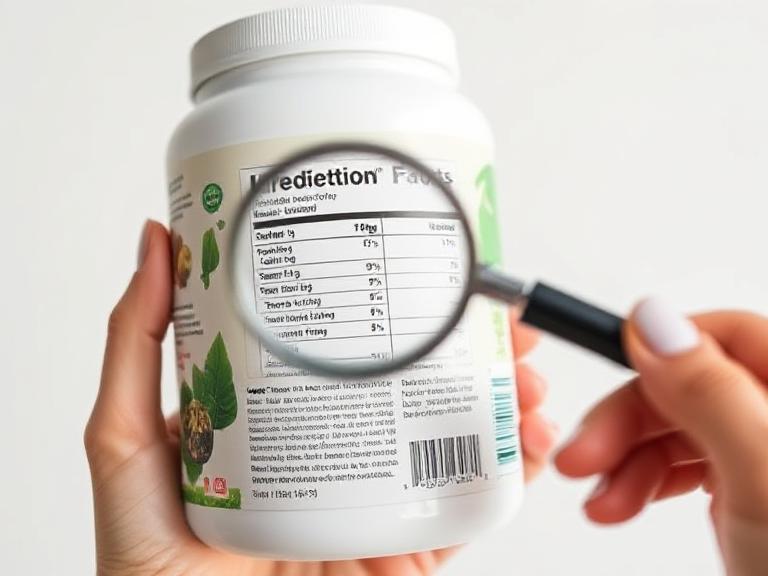
Selecting the right vegan protein powder involves more than just picking a flavor. Here are key factors to consider:
- Protein Source and Blend: Consider your dietary needs and preferences. Blends often offer a more complete amino acid profile and better texture. If you have allergies, opt for hypoallergenic options like pea or brown rice protein. Keywords: vegan protein blend, single source plant protein.
- Nutritional Profile: Check the protein content per serving, calorie count, and the presence of added sugars, artificial sweeteners, or fillers. Look for products with a high protein-to-calorie ratio. Keywords: vegan protein nutrition facts, low sugar vegan protein.
- Ingredients List: A shorter, cleaner ingredient list is generally better. Avoid products with excessive artificial ingredients, unhealthy fats, or unnecessary additives. Keywords: clean vegan protein powder, natural plant protein ingredients.
- Taste and Texture: This is highly subjective, but crucial for consistent use. Read reviews for feedback on mixability, grittiness, and overall flavor. Some brands offer sample sizes. Keywords: best tasting vegan protein, smooth vegan protein shake.
- Dietary Needs and Allergens: If you have specific allergies (e.g., soy, gluten, nuts), ensure the product is free from those ingredients. Look for certifications like “gluten-free” or “soy-free.” Keywords: allergy-friendly vegan protein, gluten-free plant protein.
- Third-Party Testing: Reputable brands often have their products tested by third-party labs for purity, potency, and contaminants like heavy metals. This adds a layer of trust and transparency. Keywords: third-party tested vegan protein, heavy metal free protein powder.
- Price and Value: Compare prices based on serving size and protein content to determine the best value for your budget. Keywords: affordable vegan protein powder, best value plant protein.
Top 5 Vegan Protein Powders: In-Depth Reviews
Here are our top picks for vegan protein powders, carefully selected to cater to a diverse range of needs and preferences for both US and UK audiences:
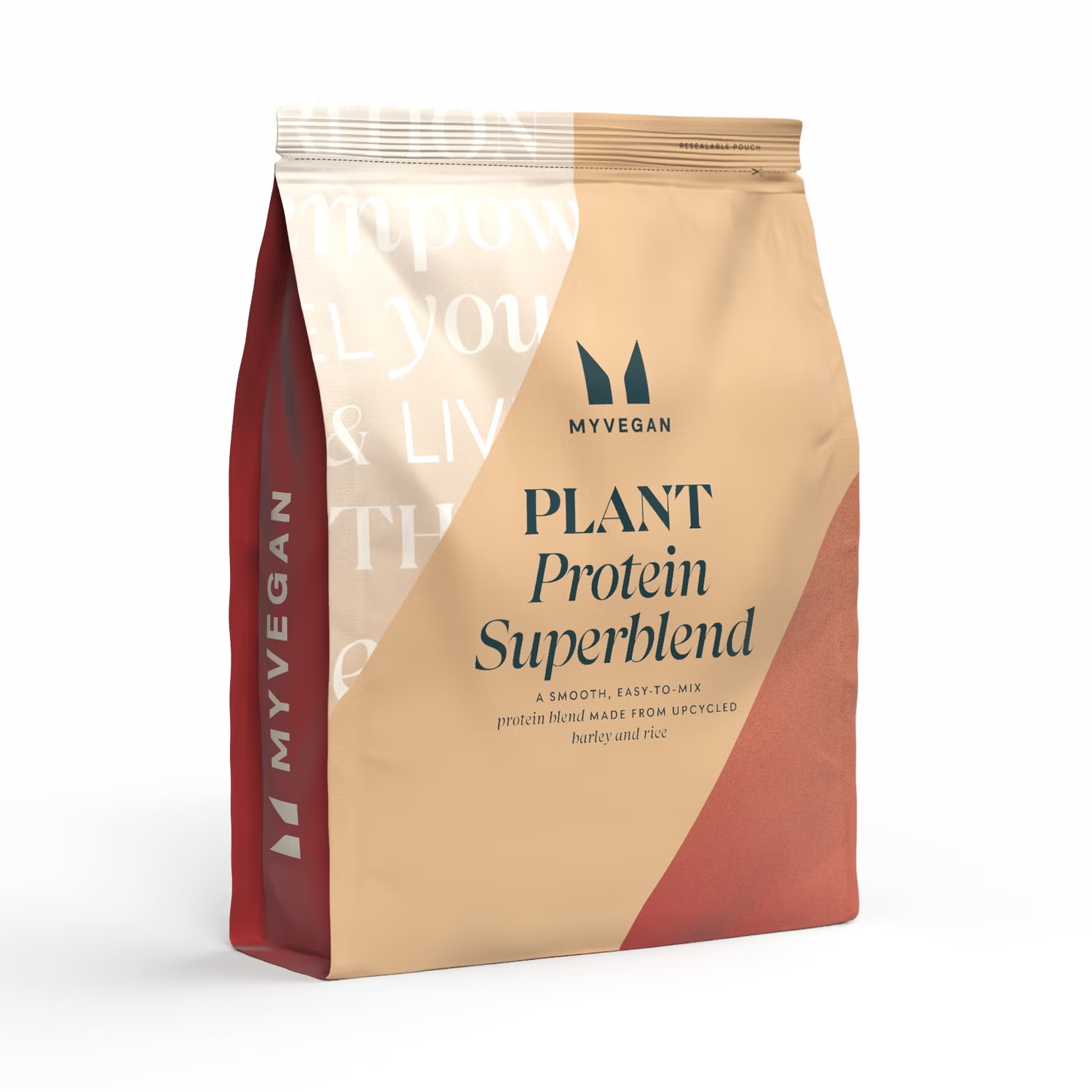
1. MyVegan Plant Protein Superblend Caramel
Why it made the cut: This product is a standout for its exceptional value, making high-quality vegan protein accessible to a broader audience. Its appealing caramel flavor also helps in making daily protein intake a more enjoyable experience. It’s a fantastic entry point for those new to vegan protein powders or for anyone looking for a reliable, budget-friendly option without compromising on taste or protein content. Keywords: MyVegan protein review, budget vegan protein UK, caramel plant protein.
Key Features:
- Protein per serving: 21g per 28g serving
- Calories per serving: 105 kcals
- Protein type: Barley rice protein
- Sweetener: Sucralose
- Flavor Profile: A rich and satisfying caramel flavor that blends well with various liquids, from water to plant-based milks. It offers a sweet treat-like experience, which can be particularly appealing for those with a sweet tooth.
- Texture & Mixability: Generally mixes well, providing a smooth consistency without excessive grittiness, especially when blended with a shaker or blender.
- Ideal for: Budget-conscious individuals, those looking for a tasty and affordable daily protein supplement, and anyone who enjoys a sweeter protein shake.
Pros:
- Excellent value for money, making it highly competitive in the market.
- Good protein content per serving for general daily supplementation.
- Pleasant caramel flavor that can help with adherence to protein goals.
- Easily accessible in both US and UK markets through MyVegan and other retailers.
Cons:
- Contains sucralose, which some individuals prefer to avoid.
- The barley rice protein blend might not offer the most comprehensive amino acid profile compared to multi-source blends, though it’s still a good source of plant-based protein.
2. WelleCo Nourish Protein Chocolate
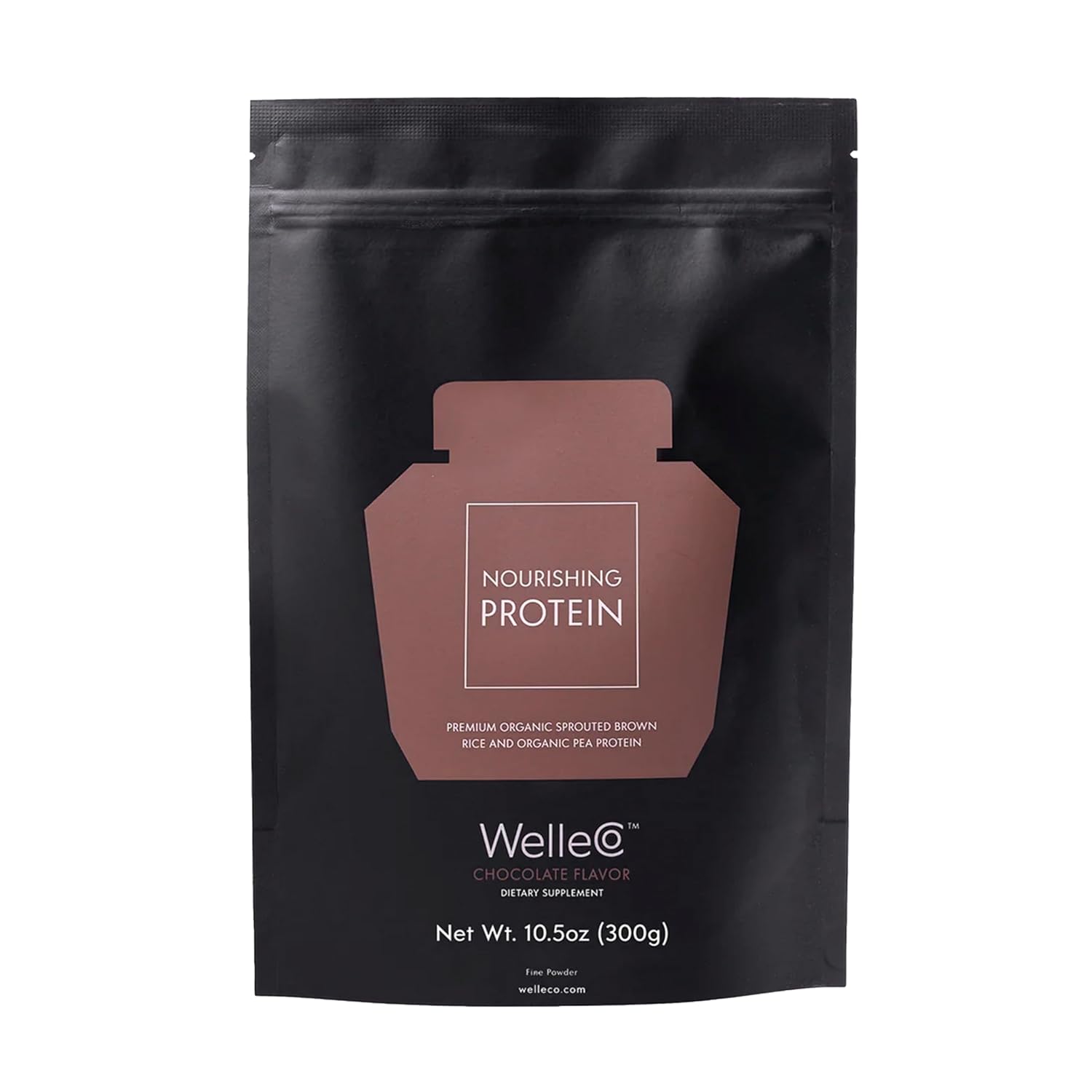
Why it made the cut: WelleCo Nourish Protein stands out as a premium option that goes beyond just protein. Its inclusion of pre- and probiotics, along with a rich blend of vitamins and minerals, positions it as a holistic wellness supplement. The superior taste and natural chocolate flavor make it a luxurious choice for those prioritizing both nutrition and sensory experience. Keywords: WelleCo protein review, premium vegan protein, chocolate plant protein with probiotics.
Key Features:
- Protein per serving: 15g per 33g serving
- Calories per serving: 123 kcals
- Protein type: Organic pea, brown rice
- Sweetener: Xylitol, fructooligosaccharides
- Flavor Profile: A deep, natural chocolate flavor derived from cocoa and cacao powder, avoiding the artificial sweetness often found in other powders. It’s designed to taste authentic and rich.
- Texture & Mixability: Known for its smooth texture and excellent mixability, creating a creamy shake that feels indulgent.
- Ideal for: Individuals seeking a high-quality, comprehensive wellness supplement, those who prioritize natural ingredients and superior taste, and anyone looking for added gut health benefits.
Pros:
- Enriched with pre- and probiotics for gut health, and essential vitamins and minerals.
- Uses natural sweeteners (xylitol, fructooligosaccharides).
- Exceptional taste and smooth texture, making it a pleasure to consume.
- Organic protein sources.
Cons:
- Higher price point compared to other options, which might not be suitable for all budgets.
- Slightly lower protein content per serving compared to some other dedicated protein powders.
3. Free Soul Vegan Protein Blend Chocolate
Why it made the cut: Free Soul has carved a niche by specifically formulating its protein blend to support women’s health. This targeted approach, combined with a robust protein profile and additional beneficial ingredients like maca and ginseng, makes it an invaluable supplement for women seeking to optimize their nutrition and well-being. Its natural chocolate flavor also ensures a pleasant experience. Keywords: Free Soul protein review, vegan protein for women, plant protein with maca.
Key Features:
- Protein per serving: 20g per 30g serving
- Calories per serving: 101 kcals
- Protein type: Pea protein isolate, hemp protein
- Sweetener: Steviol glycosides (Stevia)
- Flavor Profile: A natural, nutty chocolate flavor that avoids artificiality, making it a healthier-tasting option.
- Texture & Mixability: Mixes well, providing a smooth and enjoyable texture.
- Ideal for: Women looking for a protein powder specifically designed to support their unique nutritional needs, those seeking added vitamins and minerals for overall well-being, and individuals who prefer natural sweeteners.
Pros:
- Tailored with essential vitamins and minerals (magnesium, iron, calcium, vitamin B12) for women’s health.
- Includes adaptogens and beneficial ingredients like Peruvian maca, ginseng, guarana, and L-carnitine.
- Good protein content per serving.
- Uses stevia as a natural sweetener.
Cons:
- While formulated for women, men can also use it, but the specific targeting might deter some.
- The taste, while natural, might be less sweet than other options, which could be a con for some users.
4. Protein Works Vegan Wondershake Chocolate Bueno
Why it made the cut: The Protein Works Vegan Wondershake offers a unique and indulgent experience, setting it apart with its unique texture and flavor profile. Its multi-source protein blend and keto-friendly nature make it a versatile and high-quality option for those who appreciate innovation in their supplements. This product caters to a desire for both effective nutrition and a delightful taste experience. Keywords: Protein Works Wondershake review, keto vegan protein, best texture vegan protein.
Key Features:
- Protein per serving: 20g per 25g serving
- Calories per serving: 94 kcals
- Protein type: Pea protein isolate, soy protein isolate, pumpkin seed protein, brown rice protein
- Sweetener: Sucralose
- Flavor Profile: A distinct and indulgent Chocolate Bueno flavor, designed to mimic the popular chocolate bar. It offers a rich and satisfying taste experience.
- Texture & Mixability: Known for its thick, velvety-smooth texture and excellent mixability, creating a milkshake-like consistency that is highly appealing.
- Ideal for: Individuals seeking a premium, dessert-like protein shake, those following a keto diet, and anyone looking for a multi-source protein blend for comprehensive amino acid support.
Pros:
- Unique and highly palatable flavor that stands out from typical protein powders.
- Excellent texture and mixability, making it enjoyable to consume.
- Keto-friendly and low in calories, suitable for various dietary goals.
- Blend of four different protein sources for a complete amino acid profile.
Cons:
- Higher price point compared to some other vegan protein powders.
- Contains sucralose, which might be a concern for some users.
- The specific flavor might not appeal to everyone, as it is quite distinct.
5. Myprotein Impact Vegan Protein Powder
Why it made the cut: Myprotein is a globally recognized brand, and its Impact Vegan Protein Powder offers a highly accessible and cost-effective solution for plant-based protein needs. Its widespread availability and variety of flavors make it a go-to choice for many, especially those new to protein supplements or looking for a reliable everyday option. This product emphasizes practicality and broad appeal. Keywords: Myprotein Impact Vegan review, affordable plant protein US, best selling vegan protein.
Key Features:
- Protein per serving: Varies slightly by flavor, typically around 20-22g per serving
- Calories per serving: Varies slightly by flavor, typically around 100-120 kcals
- Protein type: Pea protein isolate, brown rice protein
- Sweetener: Varies by flavor, often sucralose or stevia
- Flavor Profile: Available in a wide range of flavors, from classic chocolate and vanilla to more unique options, catering to diverse taste preferences. (Specific flavors should be researched for the final blog post to provide examples relevant to US/UK markets).
- Texture & Mixability: Generally good mixability, though some users might find certain flavors or batches slightly grittier than premium options. Best mixed with a shaker or blender.
- Ideal for: Everyday use, budget-conscious consumers, athletes and fitness enthusiasts looking for a reliable and affordable protein source, and those who prefer a wide variety of flavor options.
Pros:
- Highly affordable and offers excellent value for money.
- Widely available in both US and UK markets, making it easy to purchase.
- Comes in a large variety of flavors, catering to different tastes.
- Good protein content per serving from a blend of pea and brown rice.
Cons:
- Some flavors might have an artificial taste or slightly less smooth texture compared to higher-end products.
- The use of sucralose in some flavors might be a drawback for those avoiding artificial sweeteners.
The Power of Plants: Why Choose Vegan Protein Powder?

The decision to incorporate vegan protein powder into your diet extends beyond simply meeting your daily protein requirements. It’s a choice that aligns with a multitude of health, ethical, and environmental benefits, making it an increasingly popular option for a diverse range of individuals. Understanding these advantages can further solidify your commitment to a plant-based lifestyle and help you appreciate the holistic value that vegan protein powders bring. Keywords: benefits of vegan protein, why choose plant protein, health advantages vegan.
Health Benefits:
- Digestibility and Reduced Bloating: One of the most commonly reported benefits of switching to vegan protein powders is improved digestion. Unlike whey protein, which can cause bloating, gas, and discomfort in individuals with lactose intolerance or dairy sensitivities, plant-based proteins are generally easier on the digestive system. This is particularly true for blends that combine different plant sources, as they often offer a more balanced amino acid profile and are less likely to cause digestive upset. Many vegan protein powders also contain digestive enzymes or probiotics, further enhancing their digestibility. Keywords: vegan protein digestion, plant protein bloating.
- Rich in Fiber and Micronutrients: While animal-based proteins primarily offer protein, vegan protein sources often come hand-in-hand with a wealth of other beneficial nutrients. For instance, pea protein and brown rice protein contribute dietary fiber, which is crucial for gut health, regulating blood sugar levels, and promoting satiety. Additionally, plant-based proteins are naturally rich in various vitamins, minerals, and antioxidants that support overall health and well-being. These micronutrients play vital roles in everything from immune function to energy production. Keywords: fiber in vegan protein, plant protein nutrients.
- Lower in Saturated Fat and Cholesterol-Free: Vegan protein powders are inherently free of cholesterol and typically much lower in saturated fat compared to their animal-derived counterparts. A diet high in saturated fat and cholesterol has been linked to an increased risk of heart disease. By opting for plant-based protein, you can contribute to a healthier cardiovascular system and reduce your intake of these potentially harmful components. Keywords: vegan protein heart health, low fat plant protein.
- Alkalizing Effect: Many plant-based foods, including the sources used in vegan protein powders, have an alkalizing effect on the body. In contrast, animal proteins can be acid-forming. Maintaining a balanced pH level in the body is believed to support overall health and may help prevent various chronic diseases. Keywords: alkaline vegan protein, plant-based pH balance.
- Supports Weight Management: Protein is a macronutrient known for its ability to promote satiety, helping you feel fuller for longer. This can naturally lead to reduced calorie intake and aid in weight management or loss. Vegan protein powders, especially those with added fiber, can be an excellent tool for controlling appetite and supporting a healthy metabolism. Keywords: vegan protein weight control, plant protein appetite suppressant.
Ethical and Environmental Benefits:
- Animal Welfare: Choosing vegan protein powders directly supports animal welfare by reducing the demand for animal agriculture. This is a significant consideration for individuals who are committed to preventing animal cruelty and promoting compassionate living. Keywords: cruelty-free protein, vegan ethics.
- Reduced Environmental Impact: The production of plant-based protein generally has a significantly lower environmental footprint compared to animal protein production. Animal agriculture is a major contributor to greenhouse gas emissions, deforestation, and water pollution. By opting for vegan protein, you contribute to a more sustainable food system and help conserve natural resources. Keywords: eco-friendly protein powder, sustainable plant-based.
- Sustainable Sourcing: Many vegan protein powder brands are increasingly focusing on sustainable and ethical sourcing practices for their ingredients. This includes supporting organic farming, fair trade practices, and minimizing their carbon footprint throughout the production process. This commitment to sustainability makes vegan protein a more responsible choice for the planet. Keywords: ethically sourced vegan protein, organic plant protein.
In summary, vegan protein powders offer a compelling package of benefits that extend beyond mere muscle building. They provide a nutritious, digestible, and environmentally conscious way to meet your protein needs, making them an excellent choice for anyone looking to enhance their health and contribute to a more sustainable future.

Beyond the Shake: Creative Ways to Use Vegan Protein Powder
While a quick protein shake is the most common and convenient way to consume protein powder, limiting its use to just shakes means missing out on a world of culinary possibilities. Vegan protein powders are incredibly versatile and can be seamlessly integrated into a variety of dishes, boosting their nutritional content without compromising on taste. Expanding your usage beyond the shaker bottle can also help prevent flavor fatigue and make your protein intake more enjoyable. Keywords: how to use vegan protein, vegan protein recipes, plant protein cooking.
1. Supercharged Smoothies and Smoothie Bowls:
This is perhaps the most obvious, but also the most customizable. Beyond just water or plant milk, experiment with different fruits (berries, bananas, mangoes), vegetables (spinach, kale, avocado), nuts, seeds (chia, flax, hemp), and healthy fats (nut butters, coconut oil). Adding a scoop of vegan protein powder transforms a simple smoothie into a complete, balanced meal or a substantial snack. For smoothie bowls, reduce the liquid to create a thicker consistency, then top with granola, fresh fruit, nuts, and seeds for added texture and nutrients. Keywords: vegan protein smoothie recipes, plant-based smoothie bowl.
2. Boosted Breakfasts:
- Oatmeal and Porridge: Stir a scoop of unflavored or flavored vegan protein powder into your hot oatmeal or overnight oats after cooking or soaking. This significantly increases the protein content, keeping you fuller for longer and providing sustained energy. Add fruits, nuts, and a drizzle of maple syrup for a delicious and nutritious start to your day. Keywords: protein oatmeal vegan, plant protein porridge.
- Pancakes and Waffles: Incorporate protein powder directly into your pancake or waffle batter. Replace a small portion of the flour with protein powder (start with 1/4 cup per cup of flour) to create a protein-packed breakfast that tastes just as good, if not better. This is an excellent way to make a traditionally carb-heavy meal more balanced. Keywords: vegan protein pancakes, plant-based protein waffles.
- Vegan Yogurt Parfaits: Layer vegan yogurt with protein powder (mixed in or sprinkled), granola, and fresh berries for a quick and easy protein-rich breakfast or snack. Keywords: protein yogurt vegan, plant-based parfait.
3. Protein-Packed Baking:
Vegan protein powder can be a secret ingredient in your baking endeavors, adding a nutritional punch to your favorite treats. It can partially replace flour in recipes, but be mindful of the type of protein powder, as some can alter the texture. Pea protein and brown rice protein tend to work well in baking.
- Muffins and Breads: Add a scoop or two to your muffin, bread, or even cookie recipes. This is a great way to make snacks more satisfying and reduce the overall sugar content if you use unflavored or naturally sweetened powders. Keywords: vegan protein muffins, plant protein baking.
- Energy Balls and Bars: Combine protein powder with oats, nut butter, dates, and other dried fruits or seeds to create no-bake energy balls or bars. These are perfect for pre- or post-workout fuel or a healthy snack on the go. Keywords: vegan protein energy balls, plant-based protein bars recipe.
- Brownies and Cakes: For a healthier twist on desserts, experiment with adding protein powder to your brownie or cake mixes. This can increase the protein content and often results in a denser, more satisfying texture. Keywords: vegan protein brownies, plant protein cake.
4. Savory Applications:
While most protein powders are flavored for sweet applications, unflavored varieties can be surprisingly versatile in savory dishes.
- Soups and Stews: Stir unflavored protein powder into creamy soups or stews at the end of cooking to thicken them and add a protein boost. Ensure it dissolves completely to avoid lumps. Keywords: unflavored vegan protein recipes, plant protein in soup.
- Sauces and Dips: Mix unflavored protein powder into homemade sauces, gravies, or dips like hummus or cashew cream. This is a subtle way to increase protein intake without altering the flavor profile significantly. Keywords: vegan protein sauce, plant protein hummus.
- Vegan Burgers and Patties: When making homemade vegan burgers or vegetable patties, a bit of unflavored protein powder can act as a binder and enhance the protein content. Keywords: vegan protein burger recipe, plant protein patties.
5. Coffee and Tea Enhancements:
For a quick and easy protein boost, especially in the morning, consider adding a scoop of unflavored or complementary flavored protein powder (like vanilla or chocolate) to your coffee or tea. Blend it in for a smooth, creamy texture. This can turn your regular beverage into a satisfying, protein-rich drink. Keywords: protein coffee vegan, plant protein tea.
By exploring these creative uses, you can seamlessly integrate vegan protein powder into your diet, making it a delicious and effective tool for achieving your health and fitness goals.
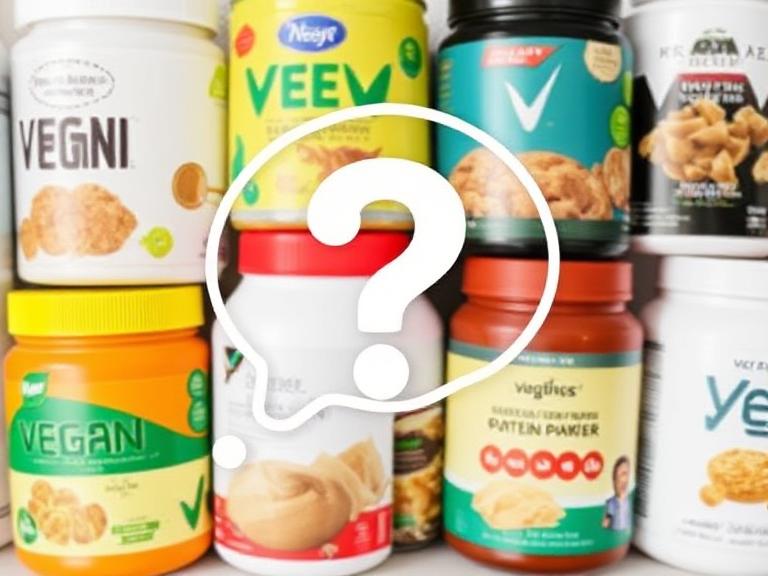
Addressing Common Concerns and FAQs About Vegan Protein Powder
As with any dietary supplement, vegan protein powders often come with a set of questions and concerns. Addressing these can help potential users feel more confident and informed about incorporating these products into their lifestyle. Here, we tackle some of the most frequently asked questions and common issues associated with vegan protein powders. Keywords: vegan protein FAQs, plant protein concerns, common questions vegan supplements.
1. “Do vegan protein powders taste good?”
This is perhaps the most common concern, and for good reason. Early generations of vegan protein powders were often criticized for their gritty texture and earthy, sometimes unpleasant, taste. However, the industry has made significant strides in recent years. Modern vegan protein powders, especially those from reputable brands, now offer a wide array of delicious flavors and much-improved textures.
- Flavor Variety: Beyond the traditional chocolate and vanilla, you can now find flavors like caramel, berry, coffee, and even unique dessert-inspired options. Many brands use natural flavorings and sweeteners to enhance the taste. Keywords: best tasting vegan protein powder, vegan protein flavor options.
- Texture Improvement: Formulations have evolved to reduce grittiness. Blends of different protein sources (e.g., pea and rice) often result in a smoother consistency. Using a blender rather than just a shaker bottle can also significantly improve texture. Keywords: smooth vegan protein, non-gritty plant protein.
- Mixing Medium: The liquid you mix your protein powder with can dramatically affect the taste and texture. While water is convenient, plant-based milks (almond, oat, soy) or blending into smoothies can mask any undesirable notes and create a creamier, more palatable drink. Keywords: how to mix vegan protein, best liquid for plant protein.
2. “Will I get enough protein on a vegan diet with these powders?”
Absolutely. Vegan protein powders are specifically designed to help individuals meet their protein requirements, especially those with higher needs due to activity levels or specific dietary goals. Most vegan protein powders provide 15-25 grams of protein per serving, comparable to or even exceeding many animal-based protein powders.
- Complete Protein Sources: Many vegan protein powders utilize blends of different plant proteins (like pea and rice) to ensure a complete amino acid profile, meaning they provide all nine essential amino acids that the body cannot produce on its own. Keywords: complete vegan protein, plant protein amino acids.
- Bioavailability: While some plant proteins might have slightly lower bioavailability than animal proteins, combining different plant sources or consuming a varied plant-based diet throughout the day ensures you get all the necessary amino acids. Keywords: vegan protein bioavailability, plant protein absorption.
3. “Are vegan protein powders safe?”
Generally, yes. Vegan protein powders are safe for most individuals when consumed as directed. However, as with any supplement, it’s important to choose high-quality products and be aware of potential issues:
- Third-Party Testing: Look for brands that conduct third-party testing for heavy metals, contaminants, and label accuracy. This ensures the product is pure and contains what it claims. Keywords: safe vegan protein powder, third-party tested plant protein.
- Allergens: While vegan, some powders may contain common allergens like soy or nuts. Always check the ingredient list carefully if you have allergies. Keywords: vegan protein allergens, soy-free plant protein.
- Sweeteners and Additives: Some individuals may be sensitive to artificial sweeteners (like sucralose) or certain additives. Opt for products with natural sweeteners or minimal ingredients if you experience digestive discomfort. Keywords: natural vegan protein powder, plant protein without artificial sweeteners.
4. “Can vegan protein powder cause bloating or digestive issues?”
While vegan protein powders are often chosen for their digestibility, some individuals may still experience bloating or digestive upset. This can be due to several factors:
- Fiber Content: Some plant proteins, particularly those high in fiber, can cause gas or bloating if your digestive system isn’t accustomed to them. Gradually increasing your intake can help. Keywords: vegan protein bloating solution, plant protein digestive issues.
- Specific Ingredients: Certain ingredients like sugar alcohols (e.g., erythritol, xylitol in large amounts) or specific plant protein types might not agree with everyone. Experimenting with different brands and protein sources can help identify what works best for you. Keywords: sensitive stomach vegan protein, low FODMAP plant protein.
- Digestive Enzymes/Probiotics: Many vegan protein powders now include digestive enzymes or probiotics to aid digestion and reduce bloating. Look for these additions if you have a sensitive stomach. Keywords: vegan protein with digestive enzymes, plant protein with probiotics for gut health.
5. “Is vegan protein powder only for athletes or bodybuilders?”
Not at all. While popular among athletes for muscle recovery and growth, vegan protein powder is beneficial for a much wider audience:
- General Health: It can help ensure adequate protein intake for anyone following a plant-based diet, supporting overall health, satiety, and energy levels. Keywords: vegan protein for everyone, plant protein daily use.
- Weight Management: Protein helps with satiety, making it a useful tool for weight loss or maintenance. Keywords: vegan protein for weight management, plant protein meal replacement.
- Busy Lifestyles: For those with hectic schedules, protein powder offers a quick and convenient way to get a nutrient boost. Keywords: vegan protein for busy people, quick plant protein meal.
- Aging Population: As we age, maintaining muscle mass becomes crucial. Protein powder can help older adults meet their protein needs to prevent sarcopenia. Keywords: vegan protein for seniors, plant protein muscle maintenance aging.
By understanding these common concerns and how to address them, you can confidently choose and incorporate vegan protein powders into your diet, reaping their numerous benefits.
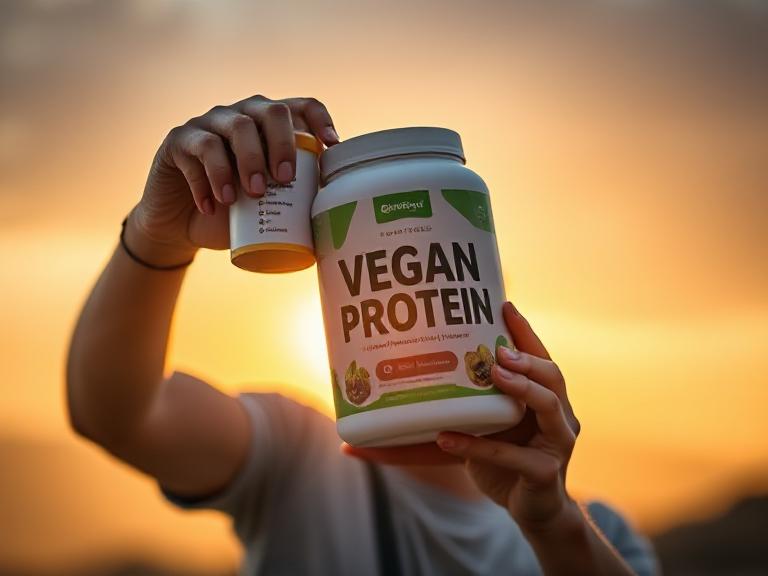
Conclusion: Empowering Your Plant-Based Nutrition
The landscape of vegan protein powders has evolved dramatically, offering an impressive array of options that cater to diverse tastes, dietary needs, and budgets. From the budget-friendly accessibility of MyVegan Plant Protein Superblend to the holistic wellness approach of WelleCo Nourish Protein, the targeted support of Free Soul Vegan Protein Blend for women, the indulgent experience of Protein Works Vegan Wondershake, and the widespread availability of Myprotein Impact Vegan Protein Powder, there is a high-quality plant-based protein solution for everyone. Keywords: best vegan protein 2025, top plant protein choices, vegan supplement guide.
Choosing the right vegan protein powder is a personal journey, influenced by your individual health goals, taste preferences, and ethical considerations. By understanding the different protein sources, scrutinizing ingredient lists, and considering the factors we’ve outlined, you can confidently select a product that not only meets your nutritional requirements but also enhances your overall well-being. Remember that vegan protein powders are more than just supplements; they are a powerful tool to support muscle growth, aid recovery, manage weight, and contribute to a more sustainable and compassionate lifestyle. Keywords: vegan nutrition tips, plant-based health goals, empowering vegan diet.
We encourage you to explore the options presented in this guide, read reviews, and perhaps even try a few different brands or flavors to discover what works best for you. Embrace the versatility of vegan protein powder by incorporating it into your shakes, smoothies, baked goods, and even savory dishes. By doing so, you’ll unlock a world of delicious and nutritious possibilities, empowering your plant-based nutrition journey and helping you achieve your health and fitness aspirations. Keywords: explore vegan protein, plant-based lifestyle support, achieve fitness with vegan protein